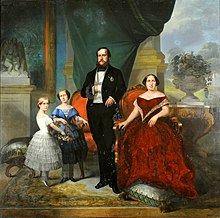
Back والدان Arabic Valideyn Azerbaijani Ата-әсә Bashkir Magurang BCL Бацькі BE-X-OLD Родител Bulgarian Kuitan BJN অভিভাবক Bengali/Bangla Roditelj BS Progenitor Catalan

A parent is either the progenitor of a child or, in humans, it can refer to a caregiver or legal guardian. The gametes of a parent result in a child, a male through the sperm, and a female through the ovum. Parents are first-degree relatives and have 50% genetic meet. A female can also become a parent through surrogacy. Some parents may be adoptive parents, who nurture and raise an offspring, but are not biologically related to the child. Orphans without adoptive parents can be raised by their grandparents or other family members.
A parent can also be elaborated as an ancestor removed one generation. With recent medical advances, it is possible to have more than two biological parents.[1][2][3] Examples of third biological parents include instances involving surrogacy or a third person who has provided DNA samples during an assisted reproductive procedure that has altered the recipients' genetic material.[4]
The most common types of parents are mothers, fathers, step-parents, and grandparents. A mother is "a woman in relation to a child or children to whom she has given birth."[5] The extent to which it is socially acceptable for a parent to be involved in their offspring's life varies from culture to culture, however one that exhibits too little involvement is sometimes said to exhibit child neglect,[6] while one that is too involved is sometimes said to be overprotective, cosseting, nosey, or intrusive.[7]
- ^ Gallagher, James (2013-06-28). "UK government backs three-person IVF". BBC News. Retrieved 30 June 2013.
- ^ Nadine Taub; Beth Anne Wolfson; Carla M. Palumbo. The Law of Sex Discrimination. p. 374.
- ^ Browne C. Lewis (2012). Papa's Baby: Paternity and Artificial Insemination. p. 136.
- ^ Louise I. Gerdes (2009). Reproductive Technologies. p. 25.
- ^ "mother definition". www.oxforddictionaries.com. Oxford Dictionaries. Archived from the original on October 10, 2012.
- ^ Marian S Harris (2014). Racial Disproportionality in Child Welfare. p. 2.
- ^ Bernard Roberts (2005). Evidence in the Psychological Therapies: A Critical Guidance for Practitioners. p. 149.
© MMXXIII Rich X Search. We shall prevail. All rights reserved. Rich X Search